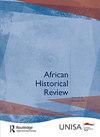The Small Matter of “Sellouts”: Chiefs, History, Politics, and the State at Zimbabwe’s Independence, 1980–1985
IF 0.1
Q3 HISTORY
引用次数: 1
Abstract
Abstract This article explores the relationship between chiefs and the state in Zimbabwe's immediate post-independence years. Focusing on the period 1980 to 1985, it discusses how the advent of independence in 1980 engendered tensions between the Zimbabwe African National Union–Patriotic Front (ZANU–PF) government and chieftaincy. Through a series of legal and policy instruments, the new government transferred the little power chiefs had over grassroots land and judicial processes to bureaucratic and party functionaries. Literature has largely emphasised the state's “socialist,” modernising, and democratising agenda to explain this emasculation of chiefs. However, this article foregrounds political motivations, whose base lay in colonial history, and argues that this was also a punitive response against chieftaincy's entanglement with the colonial state, particularly in the era of mass nationalism. Using archival records, newspapers, interviews, and parliamentary debates, the article demonstrates continuity in the manner in which the post-independence state related with chiefs: as in the colonial era, the relationship continued to be defined by the political interests and strategies of the governing regime.“卖国”的小事:1980-1985年津巴布韦独立时的酋长、历史、政治和国家
本文探讨了津巴布韦独立后酋长与国家之间的关系。本书以1980年至1985年为重点,讨论了1980年津巴布韦独立如何导致津巴布韦非洲民族联盟-爱国阵线(ZANU-PF)政府与酋长之间的紧张关系。通过一系列的法律和政策手段,新政府把对基层土地和司法程序的小权力移交给了官僚和党的官员。文学作品在很大程度上强调了国家的“社会主义”、现代化和民主化议程,以解释这种对酋长的阉割。然而,本文强调了政治动机,其基础在于殖民历史,并认为这也是对酋长与殖民国家纠缠的惩罚性回应,特别是在大规模民族主义的时代。通过档案记录、报纸、访谈和议会辩论,本文展示了独立后国家与酋长关系的连续性:就像在殖民时代一样,这种关系继续由统治政权的政治利益和战略来定义。
本文章由计算机程序翻译,如有差异,请以英文原文为准。
求助全文
约1分钟内获得全文
求助全文

 求助内容:
求助内容: 应助结果提醒方式:
应助结果提醒方式:


